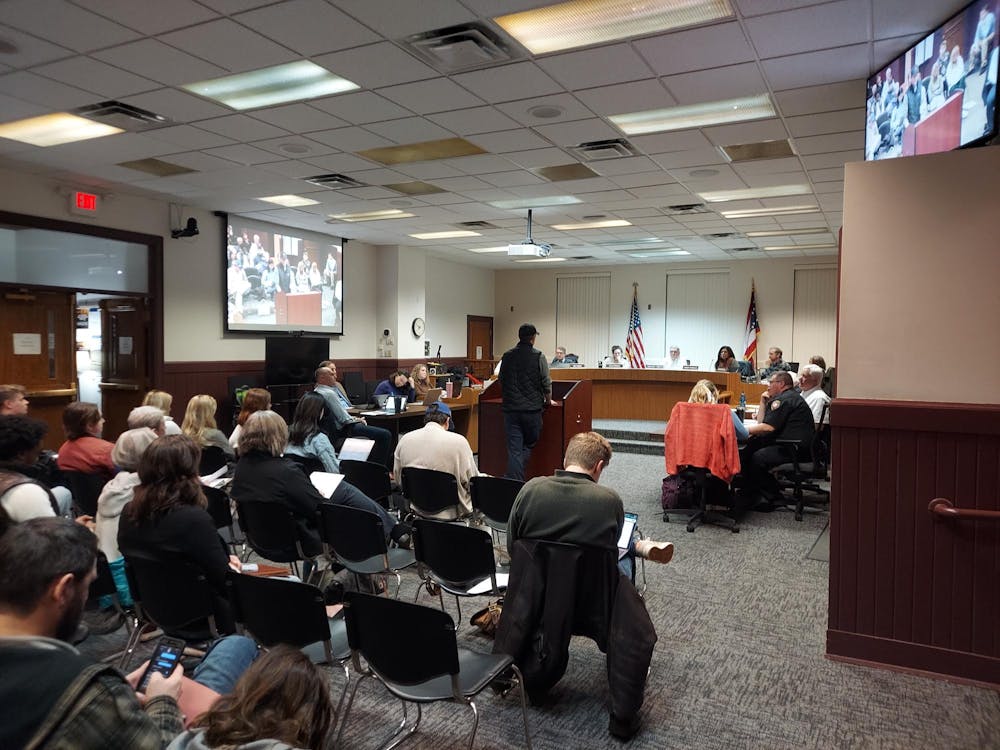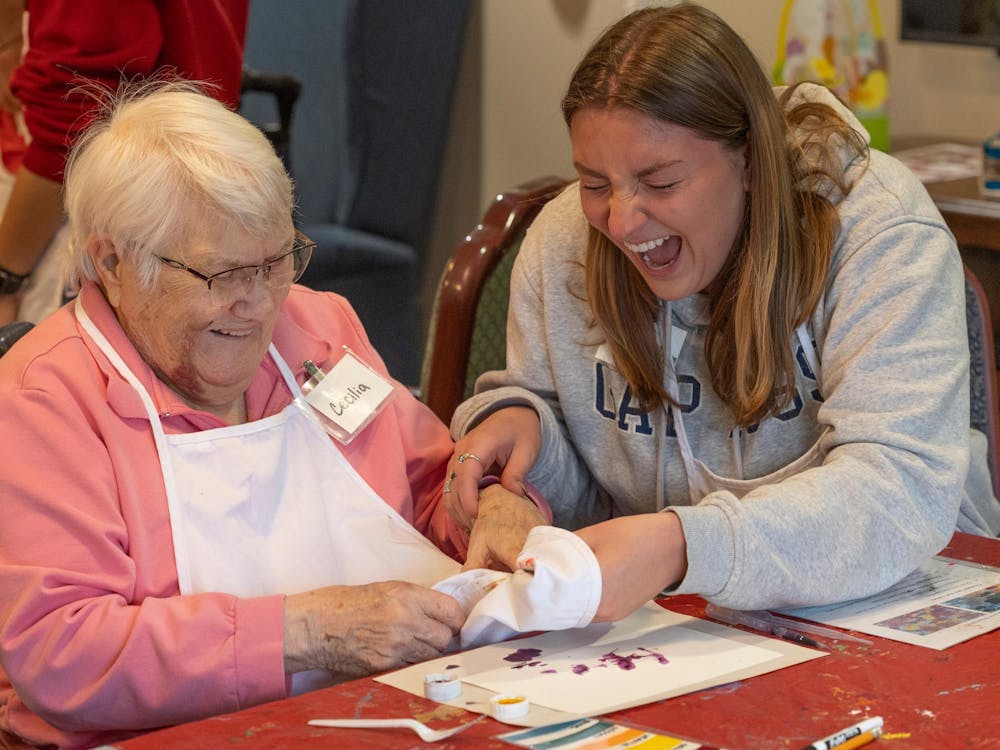This year’s November ballot will feature five candidates running for two seats on the Talawanda School Board. One incumbent – Patrick Meade – and four newcomers – Nicole Bays, Mendy Napier, Krista Stenger and David Bothast are running.
Meet the candidates
Meade, a former school teacher within the Talawanda School District, has served on the school board for the past four years and said he thinks his familiarity with the school makes him a good candidate for the board.
“Being involved in the finances for the past four years, and having worked in the school district for the previous 29, I feel I’m in a very good position to know how the decisions will affect students and teachers in the classroom,” Meade said.
During his first term, Meade worked to stop the expansion of outsourcing janitors and other staff members, placed school resource officers in every building and increased transparency by live streaming and archiving board meetings.
Among the top of Meade’s to-do list if re-elected is managing budget costs without hurting educational platforms. He also hopes to ensure students and staff members have a safe workplace, physically and mentally.
“The next budget will include audit calls for budget cuts to mental health positions, which I’m not going to go along with,” Meade said.
Bothast is a teacher in Hamilton and has three children that attend Talawanda. One pillar of his campaign is shifting away from a college-focused view.
“We need to normalize matriculating to the workforce instead of higher education,” Bothast wrote in an email to The Miami Student. “We need to provide resources that connect students to various opportunities beyond Talawanda. This may include military or direct employment on-the-job training opportunities, but also vocational training programs.”
As a current member of the Talawanda superintendent’s Committee for Diversity, Bothast also hopes to increase diversity and inclusion efforts within the district, including through teacher recruitment.
“As a teacher, I plan to negotiate the needs of the modern classroom and work closely with the Talawanda Educators’ Association in future collective bargaining and contract negotiations to ensure teacher voices are heard and represented,” Bothast wrote.
Napier, an ICU nurse, decided to run after watching her daughter struggle with remote learning during the height of the COVID-19 pandemic.
Enjoy what you're reading?
Signup for our newsletter
Because Talawanda did not have an in-person option, she transferred her daughter to another school district and advocated for the choice to go to school in person or remotely.
“We weren’t protesting for everybody to go back to face to face – what we're protesting for was honestly a choice,” Napier said.
Napier doesn’t have a background in education but sees that as a positive. She hopes to bring a new perspective to the school board with her experience in the medical field.
“I think the biggest thing that I bring is diversity to the board. Our board is made up of a bunch of educators, everybody has an education background … I just provide a different perspective.”
Because as a parent Napier has felt unheard, she plans to prioritize the success of Talawanda’s students by addressing the concerns of parents.
“We weren’t seeing the changes that we wanted to see, so we took it into our own hands,” Napier said. “I really feel like the parents have very little say, very little voice at all, when it comes to the decisions that are being made regarding our children.”
Bays, who also works in healthcare as a respiratory therapist, had a similar reason for running. After becoming more aware of her children’s educational needs during online learning, she decided to run to represent the students and parents that have felt unheard over the past year.
“I did it all just for the kids,” Bays said. “To ensure that my family, as well as other families that had similar desires, have a say on the board because I didn’t feel like our voices were really being heard.”
If elected to the school board, Bays’ main priority will be the mental health of Talawanda students, specifically looking at how COVID-19 policies affect mental health.
Stenger is a parent of two children in the district and also has experience as a substitute teacher in Butler County. She decided to run for the school board because she has attended meetings on and off since 2008 and felt like she could make a difference by running.
For her campaign, Stenger said she didn't want to advertise in the same ways as other candidates because as a candidate and school board member, she wants to be responsible with finances. Instead, she campaigns on her Facebook page, and some people have made their own homemade yard signs to show their support.
“I decided that maybe I didn’t need to do all of that,” Stenger said. “I thought just showing off who I am and what I stand for without the signs in yards, the t-shirts, business cards and stickers that everybody else does would be better.”
Stenger is also an advocate for parents’ voices to be heard on the board. As someone who has been involved with the district, she said she will continue to be regardless if she wins or not.
“I’ve been in the schools as a sub, as a parent and [enjoy] being involved with keeping our kids safe,” Stenger said. “I will continue to do those things on the board or not because there are five of us and that means three of us are going to lose … I think I’ll make a difference either way, but I do enjoy the community that has come together to support me. I’m doing it for the kids and we need a parent in there, and someone who cares.”
Issues facing the district
One issue on many voters’ minds is Talawanda’s finances. The district was placed under “fiscal watch” by the Ohio Auditor in 2020, which means it is spending 8% more than its revenue.
Candidates are split on the idea of a tax levy to alleviate this problem. Napier, Bays and Stenger don’t think there should be a levy because it would increase taxes. Stenger said she would advocate for budget cuts instead.
On the other hand, Bothast and Meade don’t think budget cuts are the answer.
“I was part of the audit process, so I feel I have a deep understanding of the positives of the audits and the flaws,” Meade said.
LaTricia Hillman, a parent of two Talawanda students, said her vote will be most influenced by the budget.
“The audit isn’t what needs to happen,” Hillman said. “It’s a suggestion. But a lot of the stuff that was suggested doesn’t work with how Talawanda has maneuvered and goes against how our community is. So the budget committee needs to take another look at how these suggestions are actually going to affect us.”
The other important factor for Hillman is experience – she would prefer people with backgrounds in education representing the school district.
“I’m voting for Bothast and Pat Meade because I feel that you have to have some kind of education knowledge,” Hillman said. “Pat Meade has done a very good job since being on the board before, and he knows what he’s doing. David’s a teacher, and he’s worked in education for as long as I’ve known him.”
Peter Lask is an Oxford resident and a parent of a Talawanda High School student. Like Hillman, Lask values having educator viewpoints on the school board.
“I would just like [voters] to vote for people who have experience in relevant fields,” Lask said. “That’s the primary concern, not people who are engaged in culture wars.”
This election cycle for the school board has highlighted many hot-button issues, sparking debates online.
Controversy arose when candidates Mendy Napier and Nicole Bays were shown in the Oxford Talk Facebook group liking a comment that read, “When the school asks your kid what pronoun they want to be called … you have the wrong people in the position,” referring to students who may want to be called by a pronoun that doesn’t align with their assigned sex.
Napier and Bays defended themselves on their joint campaign Facebook page, saying that teachers were overworked and having them ask students’ pronouns is “inappropriate” and “unfair.” A member of Oxford Talk posted a screenshot of their response to the group, and the post received 117 comments.
Another issue concerning many voters is Critical Race Theory (CRT), following the consideration of Ohio House Bills 327 and 322, which would prohibit the teaching of “divisive concepts” and other topics.
In a forum held by the League of Women Voters and The Oxford Observer, however, all of the candidates agreed that the concern is moot – CRT is more common in a college setting, and none have plans to introduce it into Talawanda’s curriculum.
While experiencing the COVID-19 pandemic and constantly changing regulations, particularly in schools, COVID-related policies are also a hot topic.
Bothast agrees with the current Talawanda policy that requires masks indoors and said masking is the most responsible and least restrictive way to protect the community.
Napier and Bays disagree. When asked in the forum if they would keep a mask mandate at Talawanda, they said no, advocating for personal choice.
Bays is concerned with the mental health issues related to masks and social distancing, which she said hinders socialization among students.
“I wish that families could have a choice whether their kids wore a mask or not, because I think it's detrimental to their mental health and some of them are acting out inappropriately in opposition to the teachers,” Bays said.
As a member of the school board, Meade voted in favor of the mask mandate in September in order to keep students safe.
In a debate held by The Oxford Observer, Stenger said she’s okay with masks for the time being but wants to reevaluate further down line to see when they can get rid of them.
When Meade, Bothast and Stenger were asked about keeping a mask mandate, they all said it was too soon to tell.
Hillman thinks regardless of who community members vote for, it is important for them to consider how their vote will impact the next four years.
“I would like them to not think of right now, this second, because this board is going to be our school board members for the next four years,” Hillman said. “They could possibly be our next board members for the next eight years. I want them to not just think of how they’re feeling now or what’s going on right now. I want them to think how this will look in a year.”
Additional reporting by Asst. Campus & Community Editor Taj Simmons and Contributing Writers Madi Jerome and Emma Wilcox.



